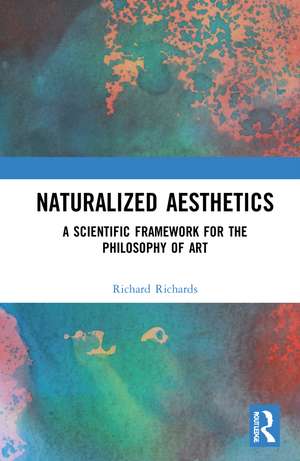Naturalized Aesthetics: A Scientific Framework for the Philosophy of Art
Autor Richard A. Richardsen Limba Engleză Hardback – 29 iun 2022
This book bridges the gap between the many insights into art provided by research in evolutionary theory, psychology, and neuroscience and those enduring normative issues best addressed by philosophy. The sciences have helped us understand how art functions, our art preferences, and the neurological systems underlying our engagement with art. But we continue to rely on philosophy to tell us what is truly good in art, how we should engage with art, and the conceptual basis for this engagement. Naturalized Aesthetics: A Scientific Framework for the Philosophy of Art integrates a systematic and comprehensive naturalism, grounded in the sciences, with an ecology of art. It shows how the environments in which we make and experience art - our engineered art niches - affect the practice and experience of art, and generate normativity - the goods and the shoulds - in our engagement with art. There are, in effect, two streams of normativity, according to this book: a niche-dependent, social, impersonal and objective stream, and a niche-independent, individual, personal and subjective stream. Recognition of these two streams allows us to make progress on long-standing and unresolved philosophical disputes about how to interpret, evaluate, and conceive art.
Key Features:- Provides a structured and critical introduction to the scientific accounts of art based on evolutionary thinking, psychology and neuroscience.
- Develops an ecology of art based on the insight that we engage with art in engineered niches.
- Presents a naturalistic account of normativity based on the recognition of two streams: a niche-dependent, social, impersonal and objective stream; and a niche-independent, individual, personal and subjective stream.
- Serves as an introduction and critical analysis of the debates about the interpretation, evaluation and definitions of art.
| Toate formatele și edițiile | Preț | Express |
|---|---|---|
| Paperback (1) | 389.66 lei 6-8 săpt. | |
| Taylor & Francis – 27 mai 2024 | 389.66 lei 6-8 săpt. | |
| Hardback (1) | 1004.72 lei 6-8 săpt. | |
| Taylor & Francis – 29 iun 2022 | 1004.72 lei 6-8 săpt. |
Preț: 1004.72 lei
Preț vechi: 1225.28 lei
-18% Nou
192.25€ • 209.49$ • 162.00£
Carte tipărită la comandă
Livrare economică 24 aprilie-08 mai
Specificații
ISBN-10: 0367440040
Pagini: 306
Dimensiuni: 152 x 229 x 19 mm
Greutate: 0.58 kg
Ediția:1
Editura: Taylor & Francis
Colecția Routledge
Locul publicării:Oxford, United Kingdom
Public țintă
Postgraduate and Undergraduate AdvancedCuprins
2. The Evolution of Art
3. The Psychology of Art
4. The Ecology of Art
5. Art Criticism
6. Interpreting Art
7. Evaluating Art
8. Defining Art
9. Conclusion
Notă biografică
Descriere
This book bridges the gap between the many insights into art provided by research in evolutionary theory, psychology, and neuroscience and those enduring normative issues best addressed by philosophy. The sciences have helped us understand how art functions, our art preferences, and the neurological systems underlying our engagement with art. But we continue to rely on philosophy to tell us what is truly good in art, how we should engage with art, and the conceptual basis for this engagement. Naturalized Aesthetics: A Scientific Framework for the Philosophy of Art integrates a systematic and comprehensive naturalism, grounded in the sciences, with an ecology of art. It shows how the environments in which we make and experience art - our engineered art niches - affect the practice and experience of art, and generate normativity - the goods and the shoulds - in our engagement with art. There are, in effect, two streams of normativity, according to this book: a niche-dependent, social, impersonal and objective stream, and a niche-independent, individual, personal and subjective stream. Recognition of these two streams allows us to make progress on long-standing and unresolved philosophical disputes about how to interpret, evaluate, and conceive art.
Key Features:
- Provides a structured and critical introduction to the scientific accounts of art based on evolutionary thinking, psychology and neuroscience.
- Develops an ecology of art based on the insight that we engage with art in engineered niches.
- Presents a naturalistic account of normativity based on the recognition of two streams: a niche-dependent, social, impersonal and objective stream; and a niche-independent, individual, personal and subjective stream.
- Serves as an introduction and critical analysis of the debates about the interpretation, evaluation and definitions of art.
